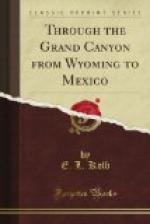There was much to interest us here. Major Powell reported finding the name “Ashley” painted under an overhanging rock on the left side of the river. Underneath was a date, rather indistinct, but found to have been 1825, by Dellenbaugh, after carefully tracing the career of Colonel Ashley who was responsible for the record. Accompanied by a number of trappers, he made the passage through this canyon at that early day. We found a trace of the record. There were three letters—A-s-h—the first two quite distinct, and underneath were black spots. It must have been pretty good paint to leave a trace after eighty-six years!
Resuming our journey we passed into deep canyon again,—the deepest we had found up to this time,—with steeply sloping, verdure-covered walls about 2700 feet high. The rapids still continued. At one rapid the remark was made that “Two feet of water would cover two hundred rocks so that our boats would pass over them.” But we did not have the two feet needed.
We had previously been informed that some of these mountains were the hiding-places of men who were “wanted” in the three states which bordered near here. Some escaping prisoners had also been traced to the mountains in this direction; then all tracks had ceased. The few peaceable ranchers who lived in these mountains were much alarmed over these reports. We found one such rancher on the plateau above the canyon, whom we will call Johnson for convenience,—living in one of the upper canyons. He sold us some provisions. In return he asked us to help him swim some of his horses across the river. He said the high water had taken out his own boat. The horses were rounded up in a mountain-hidden valley and driven into the water ahead of the boat. After securing the horses, Johnson’s welcome seemed to turn to suspicion and he questioned our reasons for being there, wanting to know what we could find in that wild country to interest us. Johnson’s sons, of whom there were several, seemed to put in most of their time at hunting and trapping, never leaving the house without a gun. The cabin home looked like an arsenal, revolvers and guns hanging on all the walls—even his daughters being familiar with their use. Although we had been very well treated after all, Mrs. Johnson especially having been very kind to us, we felt just a little relieved when the Johnson ranch was left behind. We use, in fact, a fictious name, not caring to visit on them the suspicions we ourselves felt in return.
Another morning passed in repairing the M.P. camera, and another afternoon’s work was necessary to get us out of the walls and the rapids of Red Canyon. But on the evening of the 20th, we did get out, and pulled into an open country known as Brown’s Park, one week after entering Flaming Gorge. It had not been very fast travelling; but we were through, and with no mishap more serious than a split board on the side of my boat. Under favourable conditions, and in experienced hands, this distance might have been covered in three days. But meanwhile, we were gaining a lot of experience.




